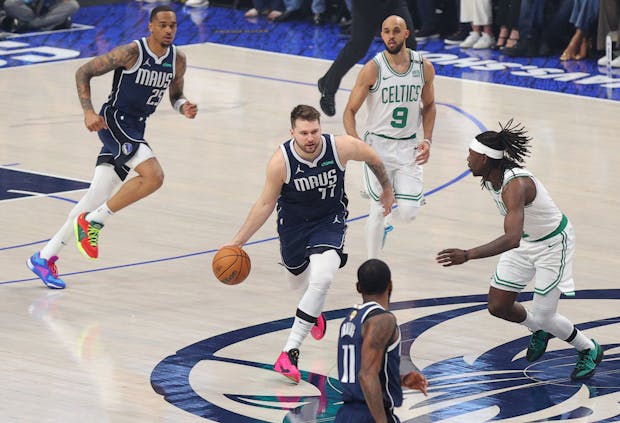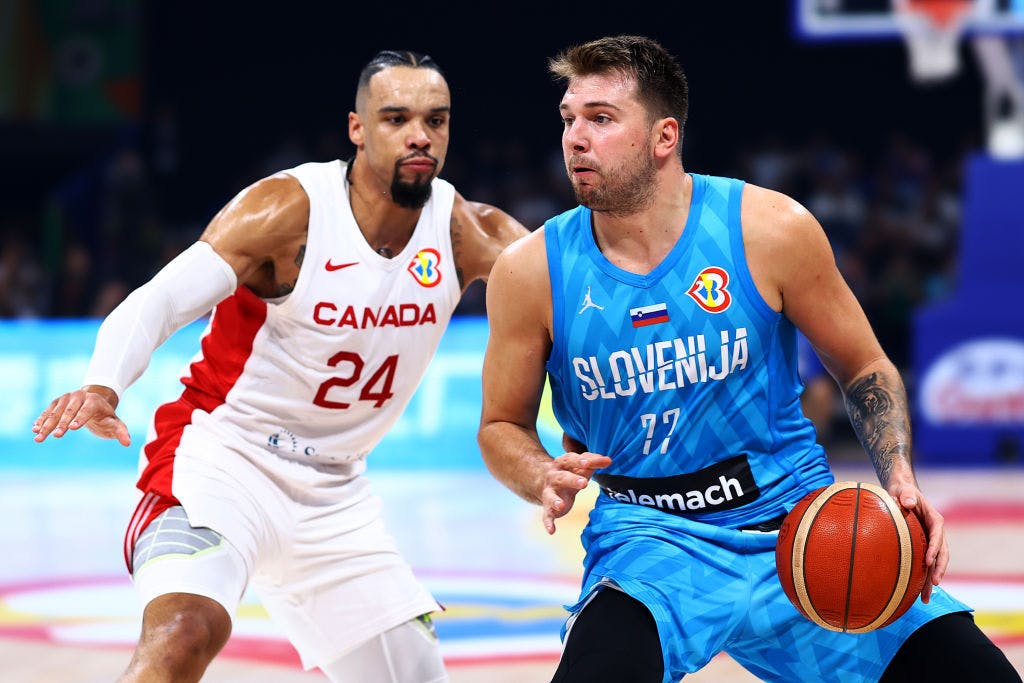
Nearly 70 per cent of the NBA’s social media engagement across central, team and player accounts comes from outside the United States, with its roster of international stars making the league a truly global attraction.
That’s according to Matthew Brabants, senior vice-president and head of international content partnerships at the NBA, who told SportBusiness that the figure is down to the league’s ability to reach international fans “wherever they are, no matter what time zone they’re consuming in and on whatever device they happen to be using, whether it’s a television, personal computer or a tablet or phone”.
This year’s NBA Finals, in which the Boston Celtics defeated Dallas Mavericks 4-1, featured 13 players from countries outside of the US, surpassing the previous record of 10 set by the San Antonio Spurs and Miami Heat in 2013. With players from Australia, Canada, the Dominican Republic, Germany, Latvia, Portugal, Slovenia and Ukraine, the league has more eyes than ever from outside of its domestic market.
However, watching live NBA games is often impossible for European fans due to the vast majority of the league’s games tipping off during the night – aside from one or two games each regular-season weekend that tip off at 9pm or 10pm CET. These time zone challenges make first- and third-party content platforms crucial for the NBA to achieve its global ambitions.
“One of the things we’ve done well is understanding we have time zone-challenged markets in some cases,” Brabants said. “Just ensuring we make the content, whether highlights or other content around the game, available to fans on platforms that they can access.”
The NBA App, which is also home to the league’s out-of-market streaming service NBA League Pass, is a vital piece of the league’s digital infrastructure and a way to engage with a fanbase that largely miss live games.
As multiple NBA games are played on each night of the regular season, international broadcasters are often forced to pick and choose between games. This drives non-domestic fans of particular teams to League Pass, which makes every non-broadcast game available of international fans. Brabants called League Pass a “complement” to the coverage from media partners.
“We would love for our games to be available in a number of different ways because we know each market is different,” Brabants said. “In some markets pay-TV may not be broadly available so going the free-to-air route for some games can be a very good option for us for some games. More and more streaming is a great option, which is why our NBA app continues to rise in popularity. We see record breaking consumption year-over-year because the streaming technology and ability for our fans to access via the NBA app is every year growing leaps and bounds.”
As evidenced by the 70-per-cent engagement figure, international fans are largely consuming the NBA via highlights and clips across social and digital channels. However, the league is also keen to find ways to drive international fans toward live games – the primary source of international revenue for the league comes from media rights agreements with its live broadcast partners.
According to SportBusiness Media research, the vast majority of the NBA’s international media rights revenue derives from China and Japan alone, as most NBA games tip off during the morning in Beijing and Tokyo, giving the league and its media partners a live sports timeslot it can work with.
However, the NBA’s combined media rights value in France, the Balkans, the Baltics and Greece – the homes of some of its biggest stars – amounts to about $16m per season.
For media rights revenue to increase in these key markets – and for fans to be able to watch their local stars in the world’s most popular basketball league – the NBA would need to deliver live games in better timeslots for international audiences. Given the billions of dollars pledged by US broadcasters from 2025-26 onward, the league may have its work cut out.
Read More from The Long Game: America’s game: The NBA’s struggle to reach its global potential
Currently, the league ensures that its European broadcast partners can offer at least one local primetime game each regular-season weekend, tipping off at 9pm or 10pm CET. Brabants says this tip-off window has been an absolute success, and that the league is exploring other ways to serve international fans the live experience they crave. The NBA says that between the launch of the initiative in 2015 and the 2023 season, viewership of the NBA primetime games on Saturdays and Sundays increased by 139 per cent in Portugal, 137 per cent in France, 109 per cent in Spain, and 27 per cent in the UK.
“We’ve seen incredible traction around those games and created a lot of momentum through making those games available in prime time,” Brabants said. “That’s definitely an initiative we want to continue, making those matchups more accessible and creating a definite opportunity to view for fans around the world in a time zone that they can enjoy without having to stay up in the middle of the night or wake up early in the morning to consume games.”
During the NBA Finals, those European-friendly windows came to an end, as US primetime audiences on free-to-air network ABC are absolutely prioritised by the league. To compensate, the league created watch parties across Europe with former NBA players in attendance.
“There’s a small percentage of fans that can attend an NBA game, let alone a Finals game, so we want to make the experience as unique as possible,” Brabants said. “[The watch parties] are really part of bringing home those experiences to our fans in addition to what we’re doing on our platforms, whether they’re partner-driven platforms or social media for example.”
Slovenian star power
Both the Celtics and the Mavericks had their share of international stars, but one stood out above the rest: Luka Dončić (pictured below) of the Dallas Mavericks.
The Mavericks were the most-viewed team on NBA League Pass in Dončić’s native home of Slovenia this season, accounting for 19 of the 20 most-watched games in 2023-24. The Mavericks’ viewership was up 613 per cent this season and NBA League Pass subscriptions in Slovenia rose 49 per cent. In Spain, where Dončić previously played for Real Madrid, the Mavericks were the second-most viewed team on the platform. Across all of Europe, Dallas games were up 25 per cent year-on-year this season.
Through the playoffs and prior to the Finals, the Mavericks were also the most-viewed team on social media with 813 million views. Dončić’s jersey was the sixth best-selling on the NBA site this year.

Pay-television broadcaster Arena Sport shows the NBA in Slovenia and has a pre-existing relationship with Dončić. The NBA works with its media partners to arrange for on-the-ground Finals coverage, which Arena Sport committed to for Games 3 and 4 of the Finals – the Mavericks’s only home games in the series loss.
“That’s something we try to do no matter which partner we’re working with, whether they have a player from their native country participating or not,” Brabants said. “We have a number of partners who don’t have a player participating but they’re still here on site looking to cover the sights and sounds for their home country.”
Another way for the NBA to cater to the international crowd is by bringing games to them. The NBA is considering options to provide memorable homecomings for its biggest international stars, as the league’s most valuable player (MVP) award has been given to a non-American player for the past six seasons.
This year, the NBA is returning to Paris where San Antonio Spurs center Victor Wembanyama will play in front of a home crowd. The league will also visit Mexico City once again, a market the NBA believes to have potential for a permanent international expansion franchise. The city is currently home to a second-tier G-League team in the shape of the Mexico City Capitanes.
Brabants did not rule out the possibility of more European markets being announced in the future for the league’s Global Games series. Possible homecomings for two-time MVP Giannis Antetokounmpo (Athens, Greece) and three-time MVP Nikola Jokić (Belgrade, Serbia) are thought to be well within the realm of possibility.